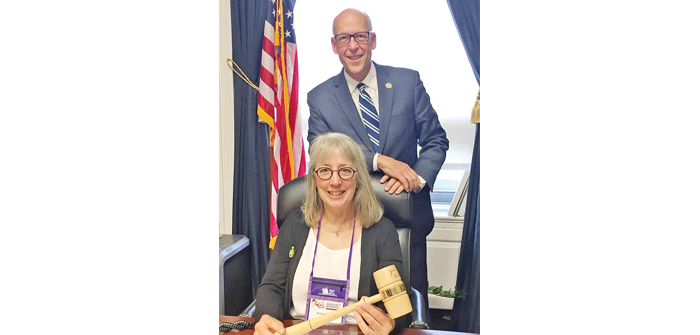(Photo above: Robyn Tatom meeting with Representative Greg Walden (R-Hood River) in his Washington, D.C. office. The gavel once belonged to former speaker of the United States House of Representatives John Boehner | Photo Courtesy of partners In Care)
On July 18, I joined more than 230 hospice advocates who convened on Capitol Hill in Washington, D.C. to meet with members of Congress. As part of our small but mighty Oregon contingency, I wanted to be a strong voice for the thousands of Central Oregon residents who will utilize hospice and palliative care services in the future. We gathered as physicians, nurses, social workers, chaplains, counselors, home health aides and volunteers to tell our patient’s stories and educate policymakers. We provided information to lawmakers on three specific policy issues that could impact the delivery of and access to hospice care at the end of life.
The first policy we brought to their attention was the Patient Choice & Quality Care Act of 2017 [H.R. 2797/S. 1334]. This law will support advance care planning in a number of ways including strengthening the portability of an Advance Directive across state lines; and will authorize an Advanced Illness Coordination Services demonstration that will allow an interdisciplinary team to provide early palliative care and home-based services to people with multiple and complex chronic health conditions.
The second policy, the Rural Access to Hospice Act [H.R. 1828/S. 2786], will correct a glitch in the current law that prohibits rural and federally qualified health clinicians from serving as their patients’ hospice attending physician. In rural areas of Oregon, this is a significant barrier to hospice care. The Act will allow these clinics and health centers to receive payment for serving as the hospice attending physician.
The third piece of legislation will address the shortage of adequately trained hospice and palliative care providers by providing this training in a variety of settings, including hospice. The Palliative Care and Hospice Education and Training Act [H.R. 1676/S. 693] will establish a program to enable hospice physicians to train healthcare professionals including nurses and clinical social workers in palliative and hospice care techniques.
All of these bipartisan, common sense bills are worthy of support, and we found receptivity to them among the representatives and their staff members with whom we met.
As Central Oregon’s leading provider of hospice and palliative care services, Partners In Care continually tracks the progress of these policy issues on behalf of patients throughout the region. Deschutes County has one of the highest hospice utilization rates in the country, which can be attributed to both the quality of and access to end of life care services. These three Acts, now before Congress, will help ensure long term stability of the hospice and palliative care community.
Robyn Tatom, LCSW manages the community-based palliative care program at Partners In Care where she has also served as director of quality.
www.partnersbend.org





